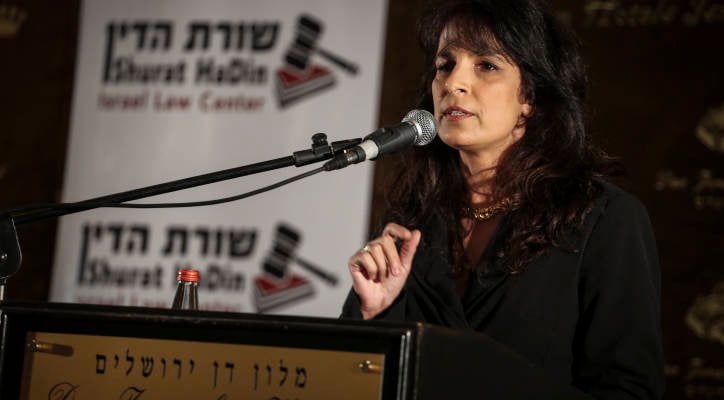Nitsana Darshan-Leitner, founder of Shurat HaDin-The Israel Law Center, and who is suing Facebook for allowing incitement to terrorism on its social media site, has little faith that a recent meeting between Facebook executives and Israeli officials will actually result in sufficient action against online incitement.
By: Ruthie Blum/The Algemeiner
The head of the organization behind a billion-dollar lawsuit against Facebook for its alleged enabling of incitement to terrorism on its pages told The Algemeiner that she was “not impressed” by Monday’s purportedly fruitful meeting between Israeli ministers and executives of the social-media giant.
“It is nothing more than the usual public-relations stunt,” said attorney Nitsana Darshan-Leitner — founder of Shurat HaDin-The Israel Law Center, an NGO whose mission is to combat terrorism through lawfare — in reference to the get-together of a visiting Facebook delegation with Justice Minister Ayelet Shaked and Public Security Minister Gilad Erdan to discuss methods for putting a stop to the incitement phenomenon. Following the meeting, all in attendance announced they would work together to fight the spread of hate-filled material that leads to physical violence.
“Even as they spoke, Facebook was proving a platform to terrorist incitement and recruitment,” Darshan-Leitner said. “And all it would have to do to — if it so decided — is press a button and remove the content in question.”
Nor is this the first time Facebook has agreed to cooperate with Israel in the effort to combat incitement, she added. “But all that happens as a result is some grandiose joint announcement, while the dangerous activity itself continues unabated on the site,” she said.
Darshan-Leitner told The Algemeiner that it was not in Facebook’s financial interest to eradicate the pages in question, which, she said, garner millions of likes, shares and comments — the platform’s lifeblood and source of massive profits. “The Hamas online magazine, for example, has four million followers,” she said.
“Until it is hit where it lives — in the pocket — Facebook won’t cease enabling terrorism,” she asserted, “which is why we are moving ahead with our class-action suit.”
Darshan-Leitner said she was optimistic about winning, due to American anti-terrorism legislation.
She concluded by saying, “Now that Facebook has made the journey from Palo Alto to Jerusalem to talk about incitement, maybe it can take the next step and actually do something about it.”
Darshan-Leitner began her legal battle against Facebook last October, at the height of the Palestinian “lone-wolf intifada,” which had begun a month earlier.
Neither incitement nor anti-Semitism was “new in the Palestinian Authority or in Gaza. But, typically, [they have] been disseminated through sermons in mosques, teachings in schools, speeches in public squares and on TV. Today, [they are] being spread like wildfire through social media networks.”
Regarding the claim that such networks can only react to incendiary material, rather than prevent it from popping up, Darshan-Leitner asserted then — and reiterated on Monday — that “it is ridiculous to say that Facebook cannot monitor these things. Notice its millions of algorithms that know exactly what you like to wear and eat, who your friends are, what music you’re interested in, etc. How else do ads aimed specifically at you mysteriously appear in your feed and on the side of the page? If it’s got algorithms for consumer purposes, it can have algorithms for other purposes, as well.”
A few months ago, Israeli lawmakers drafted legislation that could force Facebook, YouTube, Twitter and other social media platforms to remove incitement.
“There should be some measure of accountability for Internet companies regarding the illegal activities and content that is published through their services,” Justice Minister Shaked said in June at the 6th Annual International Cybersecurity Conference in Tel Aviv.
In July, Erdan accused Facebook and its founder, Mark Zuckerberg, of not doing enough to prevent incitement against Israel, and said the social network was “sabotaging” Israeli police work.
Throughout the surge in terrorism that began a year ago this month, many young Palestinians posted their intention to kill Israelis on Facebook before actually setting out to do so — and often succeeding.
